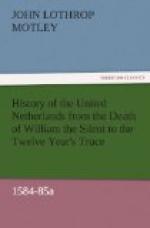Villeroy replied, by complaining, in his turn, about the dealings of the most Catholic King, with the leaguers and the rebels of France; and Mendoza rejoined by an intimation that harping upon past grievances and suspicions was hardly the way to bring about harmony in present matters.
Struck with the justice of this remark, the French Secretary of State entered at once upon business. He made a very long speech upon the tyranny which “that Englishwoman” was anew inflicting upon the Catholics in her kingdom, upon the offences which she had committed against the King of Spain, and against the King of France and his brothers, and upon the aliment which she had been yielding to the civil war in the Netherlands and in France for so many years. He then said that if Mendoza would declare with sincerity, and “without any of the duplicity of a minister”—that Philip would league himself with Henry for the purpose of invading England, in order to reduce the three kingdoms to the Catholic faith, and to place their crowns on the head of the Queen of Scotland, to whom they of right belonged; then that the King, his master, was most ready to join in so holy an enterprise. He begged Mendoza to say with what number of troops the invasion could be made; whether Philip could send any from Flanders or from Spain; how many it would be well to send from France, and under what chieftain; in what manner it would be best to communicate with his most Catholic Majesty; whether it were desirable to despatch a secret envoy to him, and of what quality such agent ought to be. He also observed that the most Christian King could not himself speak to Mendoza on the subject before having communicated the matter to the Queen-Mother, but expressed a wish that a special carrier might be forthwith despatched to Spain; for he might be sure that, on an affair of such weight, he would not have permitted himself to reveal the secret wishes of his master, except by his commands.
Mendoza replied, by enlarging with much enthusiasm on the facility with which England could be conquered by the combined power of France and Spain. If it were not a very difficult matter before—even with the jealousy between the two crowns—how much less so, now that they could join their fleets and armies; now that the arming by the one prince would not inspire the other with suspicion; now that they would be certain of finding safe harbour in each other’s kingdoms, in case of unfavourable weather and head-winds, and that they could arrange from what ports to sail, in what direction, and under what commanders. He disapproved, however, of sending a special messenger to Spain, on the ground of wishing to keep the matter entirely secret, but in reality—as he informed Philip—because he chose to keep the management in his own hands; because he could always let slip Mucio upon them, in case they should play him false; because he feared that the leaking out of the secret might discourage the Leaguers, and because he felt that the bolder and more lively were the Cardinal of Bourbon and his confederates, the stronger was the party of the King, his master, and the more intimidated and dispirited would be the mind and the forces of the most Christian King. “And this is precisely the point,” said the diplomatist, “at which a minister of your Majesty should aim at this season.”




